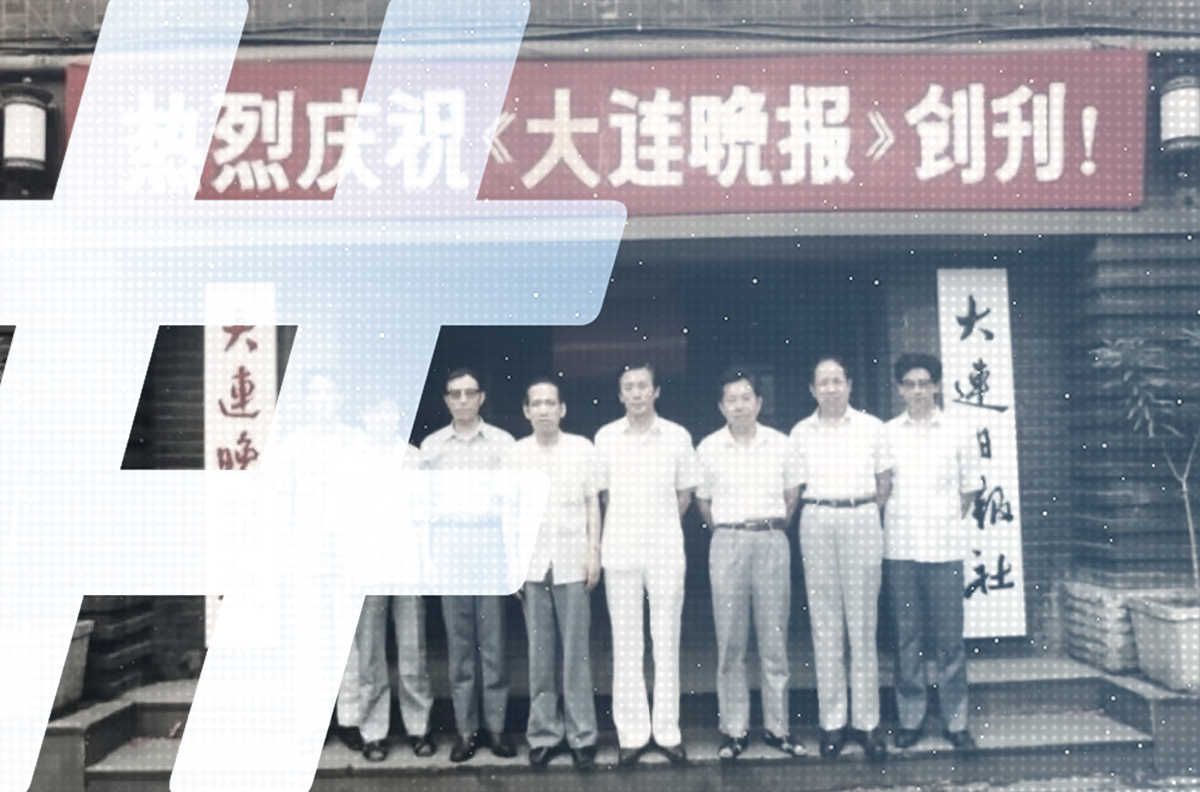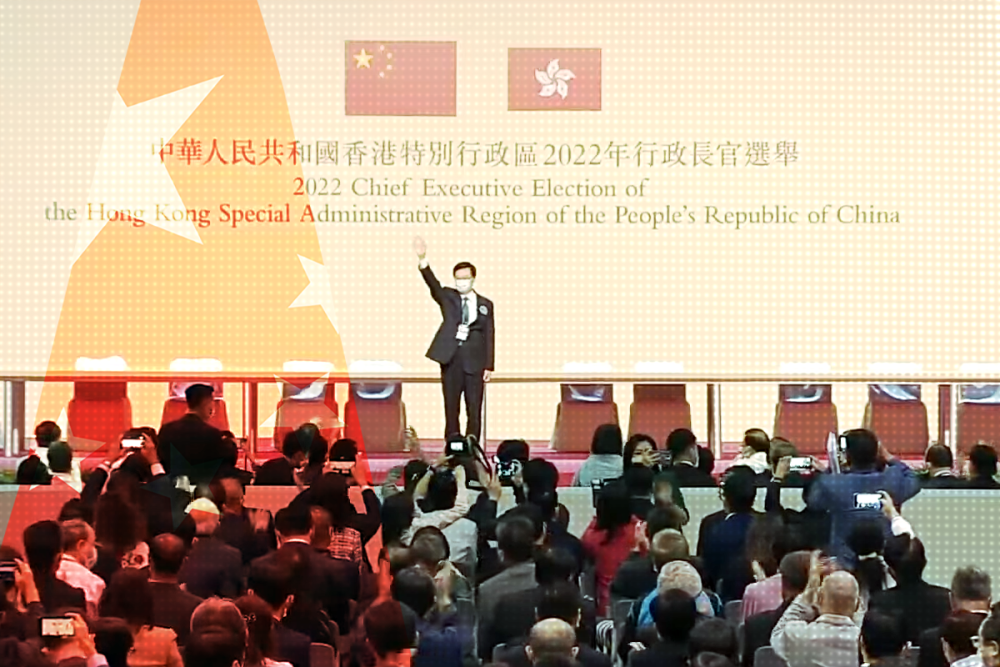
“Profound changes unseen in a century.” “High-quality development.” “Targeted poverty alleviation.” Such specialized political buzzwords may be familiar to observers of official discourse in China. But to many people in Hong Kong, they have the alien ring of a foreign language. Slowly, that may be changing.
Over the past eight months, as Chief Executive John Lee has looked to “start a new chapter” for Hong Kong, the political terminologies of the Chinese Communist Party have increasingly penetrated the language spoken by authorities in the special administrative region, which once enjoyed a unique political culture insulated from the political campaigns across the border.
Hong Kong and Macao are now expected to “better [integrate] into China’s overall development and [play] a greater role in realizing national rejuvenation,” according to Xi Jinping’s political report in October last year. So perhaps it is not surprising that Hong Kong officials have borrowed more and more frequently from the Party lexicon. But in some cases, local authorities are applying CCP expressions with markedly different meanings, or are oversimplifying them — suggesting that they are still struggling to speak this new tongue.
Telling Hong Kong’s Story Well
One such example is the phrase “telling Hong Kong’s story well” (or its official English translation, “telling good stories of Hong Kong”). The saying started to gain traction after the John Lee government took over in July last year.
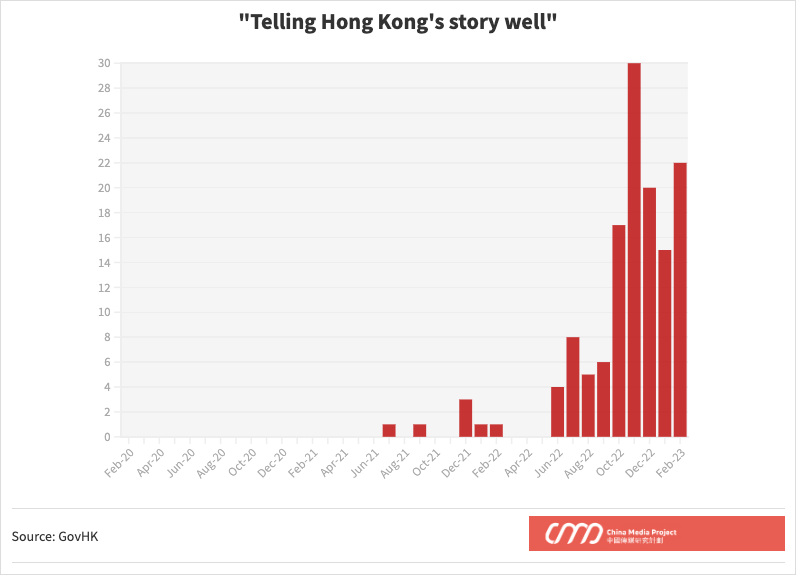
It presumably originated from “telling China’s story well” (讲好中国故事), a notion introduced by Xi Jinping in 2013 at the National Conference on Propaganda and Ideological Work. As Xi later explained, the concept involves “helping foreign audiences to realize that the [Chinese Communist Party] is truly fighting for the happiness of Chinese people and to understand why the [CCP] can, why Marxism works, and why Socialism with Chinese Characteristics is good.”
“China’s story” encompasses the success of China’s “development path,” the importance of the Party’s leadership, and the image of China as a responsible international actor that contributes to global prosperity. Enhancing the PRC’s cultural soft power by “showing the world an excellent culture which possesses Chinese characteristics, embodies Chinese spirit, and encapsulates Chinese wisdom” is also one important element.
Local “stories” in the PRC have a strong cultural element. They are also meant to be testaments to the success of the China’s systems and the Party’s governance. For example, items under a memorandum on “telling Shanghai’s story well” signed by People.cn and the Shanghai Municipal Commission of Economy and Informatization include: “advanced models and touching stories emerging from the deep practice of socialist core values of Shanghai’s economy and informatization systems”; “propaganda on Comprehensively Deepening Reform in Shanghai”; and showcasing Shanghai’s progress in “building a center of sci-tech innovation.” “Haipai culture,” which denotes the city’s distinctly cosmopolitan spirit, is also valued by local propaganda officials as an important part of “Shanghai’s story.”
Likewise, “telling Shantou’s story well” involves efforts in making the local Chaoshan cuisine “go overseas” (出海), and illustrating Shantou’s economic success as one of China’s first Special Economic Zones.
But these elements are not at the heart of the official “Hong Kong story.”
The main theme of “telling Hong Kong’s story” has been advertising the city’s “strengths, achievements, and opportunities” as a financial and tourism hub in the face of “smears” from “external forces.” In a speech titled “Uniting to Tell Hong Kong’s Story Well,” John Lee articulated his government’s goal:
We must unite and tell the world the truthful good stories of Hong Kong, to let the world know about Hong Kong, an international metropolis combining the advantages of China and the world, and to attract them for business, investment, tourism, and education.
This aim was reiterated by Lee’s top officials. Under the section “Telling Good Stories of Hong Kong” in his inaugural Policy Address, Lee spoke of promoting Hong Kong’s strengths: low taxes, large volumes of RMB trade, five of the world’s top 100 universities, a common law system, connections with mainland and ASEAN markets, an abundance of country parks, and so on.
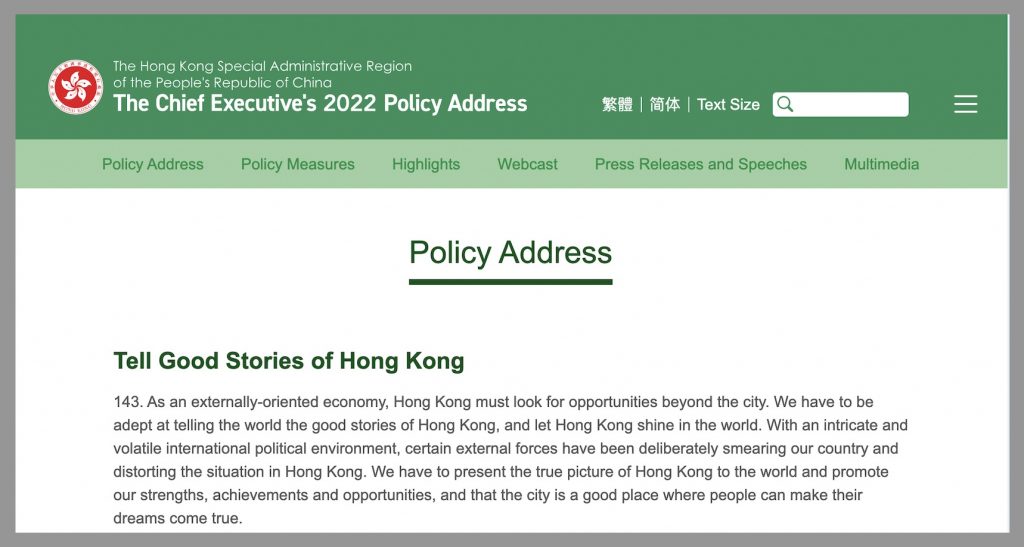
Some Hong Kong officials understand that enhancing the “communication power and influence” of Chinese culture is an important element of telling Hong Kong’s and China’s story well. However, attracting businesses, tourists, and students remains the central goal of “telling Hong Kong’s story well.”
This is manifest in the responsibilities of the newly formed Taskforce on Promoting & Branding Hong Kong, which is responsible for “telling good stories of Hong Kong.” It is composed of official members as well as representatives from foreign businesses and various sectors. Its mission: “Advise the Government on the overall strategy of promoting Hong Kong’s advantages, and a series of promotional plans and activities overseas and in the Mainland.” This will “raise the city’s international profile and enhance its branding and image so that all parties can better understand Hong Kong’s advantages, potential and opportunities.”
The phrase is also used very loosely to refer to any good news about Hong Kong, such as the success of Hong Kong contestants in a vocational skills competition.
It appears that “telling Hong Kong’s story well” has more to do with promoting Hong Kong and bringing business back to the city in the aftermath of strict Covid restrictions and earthshaking political changes. Unlike the examples of Shanghai and Shantou, it is not primarily about contributing to “China’s story.”
Targeted Poverty Alleviation… In Hong Kong?
“Targeted poverty alleviation” (精准扶贫), the PRC’s national strategy for lifting rural villages out of destitution, is another phrase that has recently been picked up by the Hong Kong government.
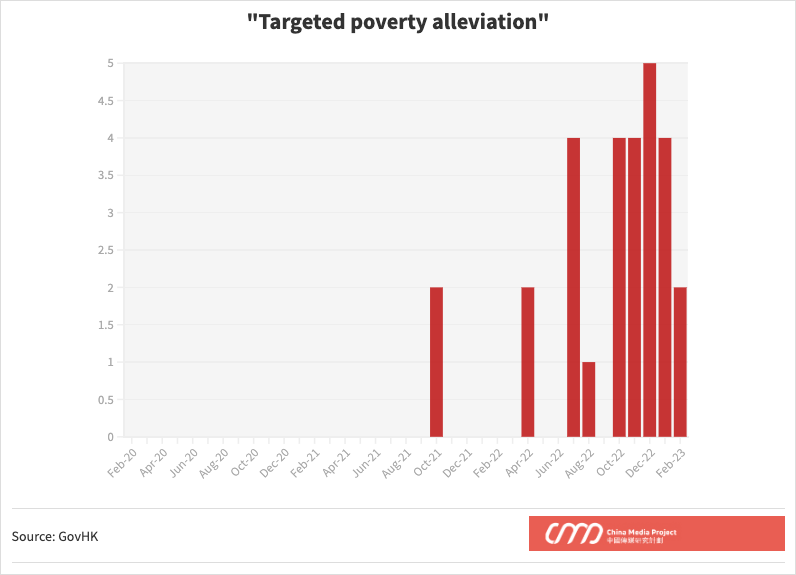
The policy was first introduced by Xi Jinping in 2013 while visiting Shibadong Village in Hunan. It was later expanded by Xi into “Targeted Efforts in Six Areas” (六个精准): precisely identifying the poor; arranging targeted aid programs; utilizing capital efficiently; taking household-based measures; appointing first Party secretaries based on village conditions; and achieving precisely defined goals.
It is a strategy that involves not only the allocation of resources but also the ruling party’s internal discipline and effective personnel management.
Targeted poverty alleviation was launched in order to realize the CCP’s “centenary goal” also known as the First Centenary Goal (第一个百年奋斗目标): “building a moderately prosperous society in all respects.” One obstacle to achieving this goal was extreme poverty in rural areas, and for this reason the CCP vowed to lift all rural populations and impoverished counties out of poverty by 2020 using “targeted” measures.
The strategy is also presented to the world, in particular to other developing countries, as the key to the China’s “victory in the fight against extreme poverty” and the “Chinese solution” to poverty. Representatives from Shibadong Village have given talks on how strong party leadership and Xi’s important instruction of “targeted poverty alleviation” helped raise local living standards.
It is clear throughout these examples that “targeted poverty alleviation” is a strategy for eliminating absolute poverty — conditions so desperate people cannot afford food or housing — among rural populations. Rarely is the phrase ever applied to first-tier mainland cities, except when these cities are providing aid to less well-off regions. Yet Hong Kong officials are of the view that the strategy applies to their own city.
The Hong Kong government says it, too, “adopts the strategy of targeted poverty alleviation.” Multiple officials have interpreted this simply as “directing resources to those most in need,” including underprivileged students. This understanding does not capture the Party governance aspect of the strategy, its connection to the First Centenary Goal, or its aim of eliminating absolute poverty. As stated by Labour and Welfare Secretary Chris Sun:
Hong Kong is indeed different from the mainland in social and economic terms. Hong Kong had already entered a very advanced state after years of development. When we practice ‘targeted poverty alleviation,’ it is not about the basic issues of food and shelter but about the problem of intergenerational poverty or the abilities of disadvantaged groups to generate wealth and work.
Why the Hong Kong government decided to use the label of “targeted poverty alleviation” in the first place is perplexing.
Getting it Right
The above examples show that not every policy phrase from the Party’s official vocabulary is applicable to Hong Kong’s distinct historical, political, and socioeconomic situation.
But there are other terms that Hong Kong officials have mostly gotten right.
“Profound changes unseen in a century” (百年未有之大变局) describes the Party’s interpretation of the the current international order. The phrase has been making regular appearances in Hong Kong policy documents and officials’ speeches. These changes are, for the most part, accurately highlighted by Hong Kong officials: the eastward shift of the world’s economic and political axis; the intensification of geopolitical tensions; the rise of anti-globalism, unilateralism and protectionism, and so on.
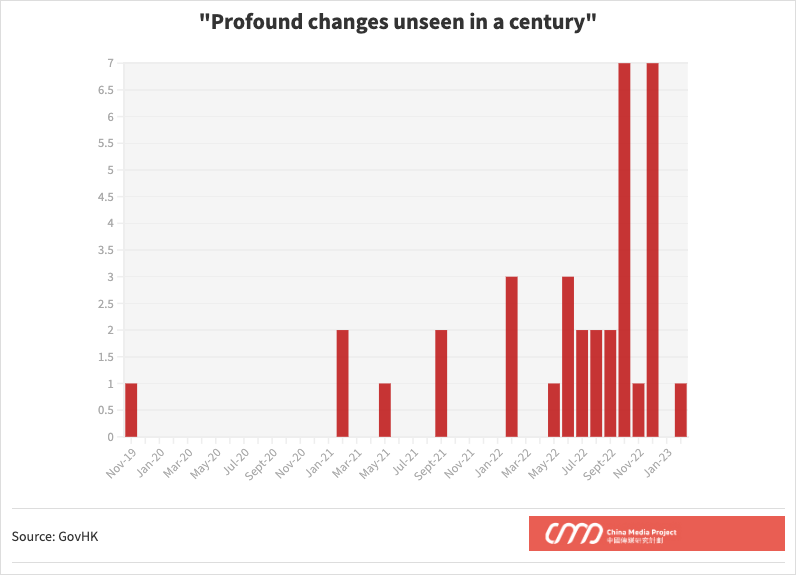
“High-quality development” (高质量发展), described by Xi as “the first and foremost task in building a modern socialist country in all respects,” is another focus of John Lee’s government. Some elements of “high-quality development,” such as science and technology innovation, green development, and digital economy, are featured in the Finance Secretary’s latest budget.
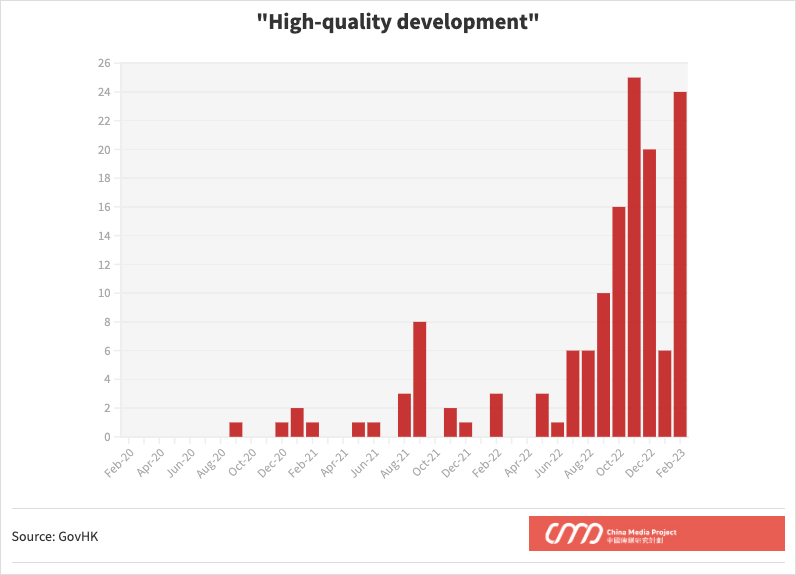
The civil service is picking up the pace in “studying” the Party’s language and policy. Senior civil servants learned what it means to “strengthen international communications” and “tell China’s story well” in a seminar with Hu Jian, Deputy Director-General of the Information Department of China’s Ministry of Foreign Affairs. The culture of “studying” also extends beyond the public service: The social welfare sector, Labour and Welfare Bureau, and Liaison Office jointly organized a study session on the Spirit of the 20th Party Congress with discussions on “targeted poverty alleviation,” among other topics. Similar study sessions and seminars are also held across other sectors and interest groups.
The current understanding of the Party’s officialese among Hong Kong officials might not be fully accurate, but with this growing emphasis on “studying” the language, we can expect the city’s officials to speak the dialect more competently, and even more frequently, as time goes on.




